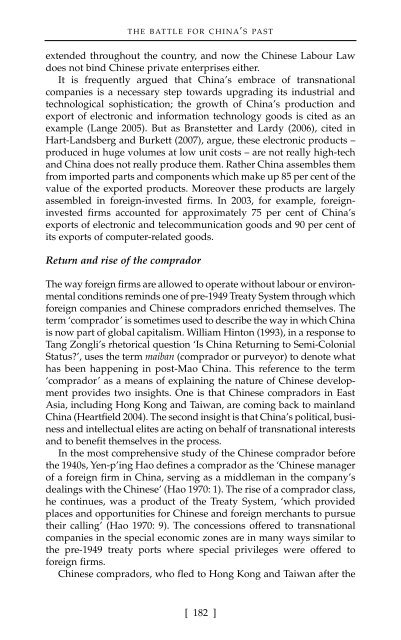Battle for China's Past : Mao and the Cultural Revolution
Battle for China's Past : Mao and the Cultural Revolution
Battle for China's Past : Mao and the Cultural Revolution
Create successful ePaper yourself
Turn your PDF publications into a flip-book with our unique Google optimized e-Paper software.
THE BATTLE FOR CHINA’ S PAST<br />
extended throughout <strong>the</strong> country, <strong>and</strong> now <strong>the</strong> Chinese Labour Law<br />
does not bind Chinese private enterprises ei<strong>the</strong>r.<br />
It is frequently argued that China’s embrace of transnational<br />
companies is a necessary step towards upgrading its industrial <strong>and</strong><br />
technological sophistication; <strong>the</strong> growth of China’s production <strong>and</strong><br />
export of electronic <strong>and</strong> in<strong>for</strong>mation technology goods is cited as an<br />
example (Lange 2005). But as Branstetter <strong>and</strong> Lardy (2006), cited in<br />
Hart-L<strong>and</strong>sberg <strong>and</strong> Burkett (2007), argue, <strong>the</strong>se electronic products –<br />
produced in huge volumes at low unit costs – are not really high-tech<br />
<strong>and</strong> China does not really produce <strong>the</strong>m. Ra<strong>the</strong>r China assembles <strong>the</strong>m<br />
from imported parts <strong>and</strong> components which make up 85 per cent of <strong>the</strong><br />
value of <strong>the</strong> exported products. Moreover <strong>the</strong>se products are largely<br />
assembled in <strong>for</strong>eign-invested firms. In 2003, <strong>for</strong> example, <strong>for</strong>eigninvested<br />
firms accounted <strong>for</strong> approximately 75 per cent of China’s<br />
exports of electronic <strong>and</strong> telecommunication goods <strong>and</strong> 90 per cent of<br />
its exports of computer-related goods.<br />
Return <strong>and</strong> rise of <strong>the</strong> comprador<br />
The way <strong>for</strong>eign firms are allowed to operate without labour or environmental<br />
conditions reminds one of pre-1949 Treaty System through which<br />
<strong>for</strong>eign companies <strong>and</strong> Chinese compradors enriched <strong>the</strong>mselves. The<br />
term ‘comprador’ is sometimes used to describe <strong>the</strong> way in which China<br />
is now part of global capitalism. William Hinton (1993), in a response to<br />
Tang Zongli’s rhetorical question ‘Is China Returning to Semi-Colonial<br />
Status?’, uses <strong>the</strong> term maiban (comprador or purveyor) to denote what<br />
has been happening in post-<strong>Mao</strong> China. This reference to <strong>the</strong> term<br />
‘comprador’ as a means of explaining <strong>the</strong> nature of Chinese development<br />
provides two insights. One is that Chinese compradors in East<br />
Asia, including Hong Kong <strong>and</strong> Taiwan, are coming back to mainl<strong>and</strong><br />
China (Heartfield 2004). The second insight is that China’s political, business<br />
<strong>and</strong> intellectual elites are acting on behalf of transnational interests<br />
<strong>and</strong> to benefit <strong>the</strong>mselves in <strong>the</strong> process.<br />
In <strong>the</strong> most comprehensive study of <strong>the</strong> Chinese comprador be<strong>for</strong>e<br />
<strong>the</strong> 1940s, Yen-p’ing Hao defines a comprador as <strong>the</strong> ‘Chinese manager<br />
of a <strong>for</strong>eign firm in China, serving as a middleman in <strong>the</strong> company’s<br />
dealings with <strong>the</strong> Chinese’ (Hao 1970: 1). The rise of a comprador class,<br />
he continues, was a product of <strong>the</strong> Treaty System, ‘which provided<br />
places <strong>and</strong> opportunities <strong>for</strong> Chinese <strong>and</strong> <strong>for</strong>eign merchants to pursue<br />
<strong>the</strong>ir calling’ (Hao 1970: 9). The concessions offered to transnational<br />
companies in <strong>the</strong> special economic zones are in many ways similar to<br />
<strong>the</strong> pre-1949 treaty ports where special privileges were offered to<br />
<strong>for</strong>eign firms.<br />
Chinese compradors, who fled to Hong Kong <strong>and</strong> Taiwan after <strong>the</strong><br />
[ 182 ]
















